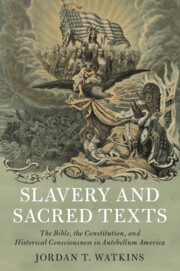 Slavery and Sacred Texts
Slavery and Sacred Texts Book contents
- Slavery and Sacred Texts
- Cambridge Historical Studies in American Law and Society
- Slavery and Sacred Texts
- Copyright page
- Dedication
- Contents
- Acknowledgments
- Prologue
- Introduction
- 1 “Recourse Must Be Had to the History of Those Times”
- 2 “The Ground Will Shake”
- 3 “Texts … Designed for Local and Temporary Use”
- 4 “The Further We Recede from the Birth of the Constitution”
- 5 “The Culture of Cotton Has Healed Its Deadly Wound”
- 6 “Times Now Are Not as They Were”
- 7 “We Have to Do Not … with the Past, but the Living Present”
- 8 A “Modern Crispus Attucks”
- Conclusion
- Epilogue
- Index
Epilogue
Published online by Cambridge University Press: 12 June 2021
- Slavery and Sacred Texts
- Cambridge Historical Studies in American Law and Society
- Slavery and Sacred Texts
- Copyright page
- Dedication
- Contents
- Acknowledgments
- Prologue
- Introduction
- 1 “Recourse Must Be Had to the History of Those Times”
- 2 “The Ground Will Shake”
- 3 “Texts … Designed for Local and Temporary Use”
- 4 “The Further We Recede from the Birth of the Constitution”
- 5 “The Culture of Cotton Has Healed Its Deadly Wound”
- 6 “Times Now Are Not as They Were”
- 7 “We Have to Do Not … with the Past, but the Living Present”
- 8 A “Modern Crispus Attucks”
- Conclusion
- Epilogue
- Index
Summary
The epilogue indicates continuities and changes in American historical thought, highlighting the persistence of the ways in which politics inform historical awareness, and also showing that Americans continue to read the Constitution and the Bible in spite of – or in light of – historical awareness. While drawing attention to these continuities, the epilogue emphasizes differences in thought as well, particularly the fact that Americans today are more likely than their antebellum predecessors to engage in or to be confronted by conversations revolving around ahistorical and historical thinking. Twenty-first-century historical consciousness can be seen in aspirationalist readings of the Constitution and approaches to the Bible that deliberately account for historical distance. In attending to both continuities and changes, the epilogue underscores Americans’ continued efforts to bridge the meaning of founding documents to our new times, while also emphasizing the limitations of these approaches. A focus on the founders has allowed white Americans to avoid fully confronting the facts of slavery and racial prejudice in our past and, as a result, in our present.
Keywords
- Type
- Chapter
- Information
- Slavery and Sacred TextsThe Bible, the Constitution, and Historical Consciousness in Antebellum America, pp. 345 - 355Publisher: Cambridge University PressPrint publication year: 2021


